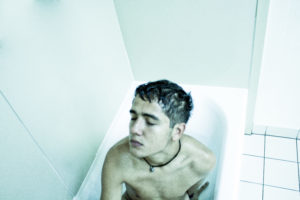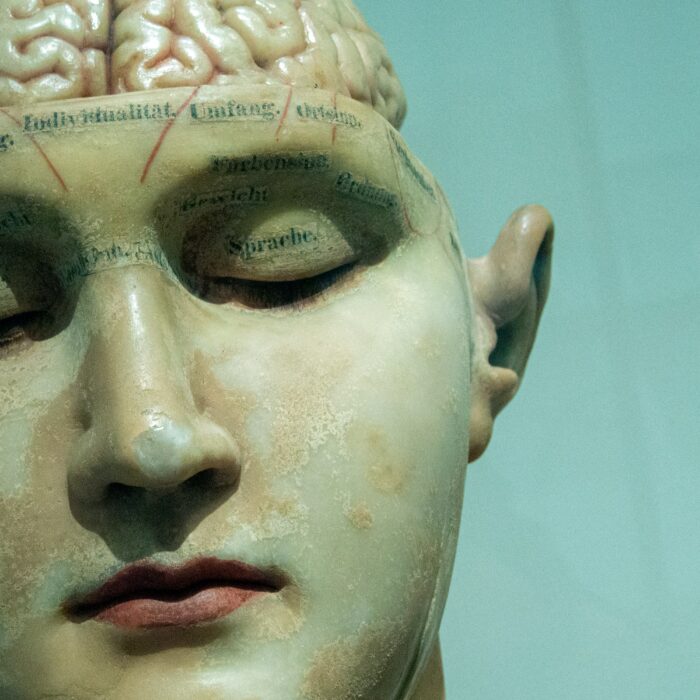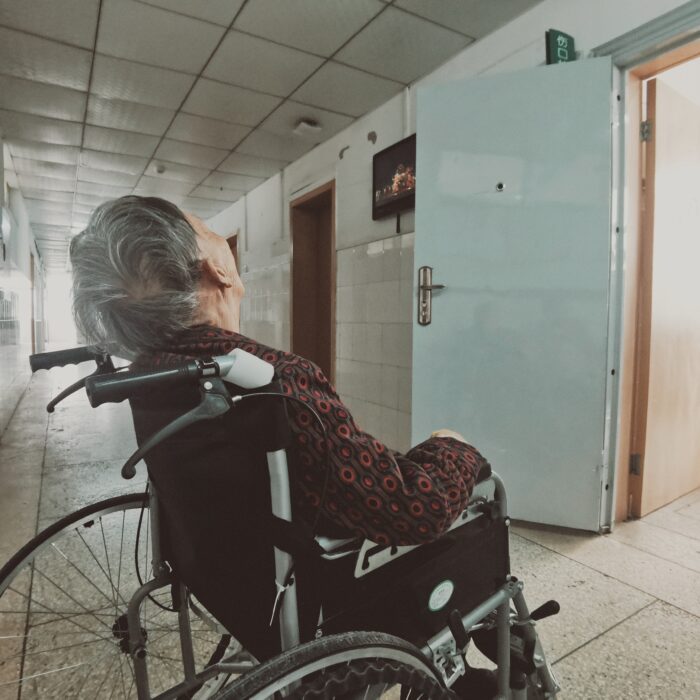You have no items in your cart. Want to get some nice things?
Go shopping
https://bit.ly/2vMYRBX
The day his sister Sara, age three, was taken away to live in an institution, Russell wailed. He was six and had cared for her, smoothing her thick, black hair with her little pink comb, putting drops into her tiny blind eyes. When his mother got Sara ready for bed, he massaged her club feet, little cauliflower heads. Russell kissed her round pink cheeks, and she smiled when she felt his lips, showing her crooked teeth. After looking at her deformities every evening, he looked at himself in the mirror before going to bed.
“Why are you crying again?” his father Frank, a psychiatrist, asked him a month after Sara had gone. Russell had been sniveling, playing with his Legos in the living room. His mother Alma was nearby, reading The New York Times in a wing-back chair.
“I miss Sara. Can we go see her?” He started to blubber.
“You have to stop that,” his father said, whacking his rear end with a rolled-up newspaper. The gesture made him weep.
His mother looked up and laughed. “That little swat makes you cry?” she said. “Don’t be such a baby.”
“We just saw her last week, Russ. Go to your room and settle down.”
He went to her bedroom, took her little pink comb, and put it in his nightstand.
Although at first his parents took him to see Sara once a week, the visits dwindled, and they never mentioned her. Years later, when he got his driver’s license while still in high school, he rarely went to see her, either because of weekend commitments or his parents’ diverting tactics. By the time she died, at age fourteen, she hadn’t known who he was, the last few times he had managed to visit.
“You can’t dwell on it, Russell. You have to toughen up,” his father said when she died from her defective, irreparable heart. He howled, an animal sound that made Alma cover her ears. He wept that night in his room holding her comb, and tucked it in his wallet before going to bed.
His grief was swirled with resentment towards his parents, and at the funeral mass he stayed away from them, sitting in the rear of the church.
That afternoon, he went into his bedroom and closed the door. Alma, a renowned composer, gave his door four firm raps, Beethoven’s Fifth, on her way to the room she used as a music studio.
“What’s wrong, Russ? Why are you so angry?”
He looked up from the laptop screen, and remained propped up on his bed. She sat down at his desk. After the funeral she had changed and was now in sweat clothes, her work outfit. Her short, black hair was somehow still coiffed, despite the sweatshirt she had pulled over her head. She picked up an underlined copy of Hamlet from his desk and flipped through it. “You haven’t said a word to us since Sara died.” She kept her eyes on the text.
“We didn’t do right by Sara. She would have been happier here at home. I wish I had gone to see her more.”
“Nobody stopped you from getting in your car and going over there.”
His mouth gaped before he could say, “Every time I was going you and dad had some chore for me to do, some need for me or my car.”
Alma looked at him, shaking her head. She tossed Hamlet back on the desk and walked out of the room.
The next day, when he went into the kitchen, his parents were finishing lunch at the table. He got a yogurt from the fridge and leaned against the sink. The sunlight through the large window behind him illuminated the African violets on the sill.
“You know, Russ, it was painful for us too,” his father said. “Not just her death, but her whole life.” He hand-swept some crumbs from the table onto the floor. “It was better for her to be in an institution. Better than here.”
“We could have afforded private nurses. She would have been surrounded by people who loved her.”
His mother’s voice was like a harsh cello. “Russell, how realistic is that? You know the expense of the equipment, the special treatments?” She shook her head. “We did what was best for her, not necessarily what we wanted.” She picked the newspaper up off the table and held it in front of her face.
“You two chose not to see her. Maybe it was painful for you, I get it. But why stop me from seeing her?”
“We wanted you to get over it.” His father got up and went to the refrigerator, which he opened, looked into, and then closed. “You were obsessed with her.”
“And,” his mother added without lowering the paper, “Sara’s living expenses were significant. The private facility where she lived was not cheap, you know. You want to go to graduate school for theater studies after college, right?”
Russell was struck mute. They were affluent and the insurance had covered most of her care. He could only look at her.
“If Sara had gone on living, I’m not so sure we would have been able to do all that for you.”
“So I’m supposed to be what? Glad that she died?”
His father rushed out of the kitchen, but his mother stayed seated, looking at the newspaper. He walked down the hall, heavy with original artwork, into his room.
*
Russell was reading a script at the small table in his cramped apartment, a few feet from the sofa where his girlfriend Mina sprawled. Her bandaged foot was up on the cushions.
“It’s so nice you got this role, Russell,” she said, eyes on the TV screen. “But can’t you sit with me? Rehearsals haven’t even started yet.”
“The first reading is tomorrow, Mina. I have to get familiar with the part.”
But she insisted, and he moved her auburn mane off the backrest and sat next to her. After a few minutes he said, “I think I’d better be alone tonight. I have to get through this script.”
“Oh, no, Russell. You promised we’d watch a movie.”
“Sorry. I really need to get this done.”
Through her protests, they rode in the elevator down to the sidewalk to hail a taxi. When a cab stopped, she got in and slid over to make room for him, but he closed the door.
“Aren’t you coming with me to help me get home?” she pleaded through the open window.
“It’s just an ankle sprain. You’ll be fine,” he said, and as he turned away he added, “or not.”
When he got upstairs he saw her painkillers on the sofa. His phone rang, Mina’s name on the screen, and he let it go to voicemail.
They had been together just a month, and this was her third crisis. Lost keys, a dead car battery, and now the ankle. This was a pattern, girlfriends whose dependency on him was the reason for the relationship. Three in the past year, one needy woman after another: one with migraines, another with two ancient cats, and now this. He wanted to have somebody in his life, but not if he had to rescue them.
This was the first acting job he had gotten in almost a year, struggling with auditions after graduate school. He was desperate to succeed, be noticed by the press, get an agent. Working as a waiter in a fancy restaurant paid the bills, but he wanted a career in the theater for the sake of his sister’s memory. His mother’s suggestion that Sara’s death had made his graduate studies possible was preposterous, but the possibility haunted him.
He ignored two more calls from Mina that evening, and worked on memorizing his part before going for takeout Chinese just before midnight. He tried to flirt with the young Asian woman behind the counter, but she scowled and turned her back on him, and he settled for looking at the naked nape, her glossy black hair tucked up into a white paper cap. He wondered what her pubic hairs would feel like on his fingertips, his cheeks.
By the time he had finished eating and showering it was one in the morning, and he was due at the theater at nine for a reading of the play. He remained nude after the shower and examined his body in the mirror, the muscular symmetry of his chest. His nose was too long and bony, but it photographed well. The glistening blond stubble on his pecs and underarms would need a waxing soon, but his head and pubic area were still hairless from the last shave.
He poured himself some absinthe and mulled over the day. He had already given notice to Rosie, the restaurant manager, for the run of the play. She had not been happy. And Mina, when was he going to break up with her? He cupped his genitals with his hand, not erotically, but for comfort. After a minute he ran his fingers over his smooth scalp and fell asleep.
*
Oscar, the pudgy director, seemed uninterested in him during rehearsals, focusing instead on the two celebrated leads. Russell felt comfortable communicating only with Rhea, the stage manager, who smiled at him and made a point of sitting close to him during breaks. During Russell’s scenes, Oscar sat with his eyes closed, double chin on his chest, red eyeglasses in his hands. Only when he took off his shirt on stage, which the part required him to do, did Oscar open his eyes.
During a break, Russell asked Rhea if she thought Oscar hated him. She had a round pretty face and a long, fat braid of mahogany hair. “No way. He’s just a snob,” Rhea whispered to him. “He fawns over the two leads and ignores everybody else, that’s all. You’re doing great.”
Oscar’s cool behavior towards him continued the second week of rehearsals, except that he corrected Russell more than he did anyone else. “Russell,” he said one afternoon, closing his eyes, “do you really want to say the line like that? Didn’t we talk about the importance of this character not being earnest, but cocky?”
Oscar kept badgering him as the first performance approached. His hands and upper lip got soaked with sweat, and he looked to Rhea for reassurance. When he didn’t need to be on stage, he burned up his anxiety by doing push-ups with his shirt off, pumping up his chest for the semi-nude scene. “Hey, Russell,” Rhea called out the day before the opening, waving her script, “you’re getting me all wound up. I have to work, you know?”
His panic abated when he saw the poster outside the theater that afternoon. “Russell Wurfel” was in smaller print than the leads, but still, a reassurance. He walked up to the poster, smiled, and put his hand on the glass. The reflection in the window reminded him of the last time he had seen Sara in the institution.
Later that day he got a call from his parents, telling him they had a bridge game on opening night and would not be able to see the show. He knew that Rhea’s parents and sister were going.
The late rehearsal the evening before the opening was announced right after lunch, but he didn’t bother calling Rosie at the restaurant. Instead, he sat on the wooden floor of the stage with Rhea. They talked about her plans to join the Peace Corps.
“Isn’t that going to sidetrack your directing career?” He slipped off his loafers and socks and massaged his feet.
“Yeah, a little. But it’s worth it.” She took one of his feet and kneaded the sole with her thumbs. “You know, I’ve been lucky all my life, and I want to do something for those who aren’t so lucky. I’m sort of doing that now.” Russell wanted to know what she meant, but he was enjoying the feel of her hands on his feet, and he was getting hard. She asked him to hold her barrette while she re-braided her hair.
Mina called him on his cell several times that evening, left three voice mails. He called her at seven after the rehearsal was over. “We have two more hours of work,” he lied. “Come backstage tomorrow after the opening and we’ll go to the cast party.”
That night he went out with some of the cast members and Oscar, who had said nothing to him about his performance for several days now. Had Oscar simply given up on him, or was he finally satisfied? He had seen him having suspiciously long talks with his understudy. When he saw Oscar at the bar getting a beer, he stood next to him to order a drink.
“How do you think it’s going, Oscar? You haven’t said anything about my performance in a while.” He signaled the waiter for beer.
“I think it’s okay.” The pudge sucked the overflowing foam from the glass. “Sometimes a performance improves during the run of the play.” He took a sip and glanced at him over the rim of the tankard. “We’ll see how it goes after the opening, how the reviews are.” He left the bar to join the leads at a table.
What did Oscar mean, “We’ll see?” He looked for Rhea for reassurance, then remembered she had not come to the party. Something to take care of at home, she had said.
He was satisfied with his performance opening night, despite the jitters. He didn’t flub any lines, and when he took his shirt off in the second act he heard appreciative sounds from the audience. It was what he, and he was sure Oscar, had hoped for. For his big scene, the confession to the male lead that he has also been to bed with his wife, he played it exactly as Oscar had insisted, callously, with a smirk. From the stage he heard the silence of an attentive audience: no programs rustling, no coughing. Please, he prayed, let there be some theater critics out there.
After the play ended, with the stage in blackout, Oscar ignored him but gave thumbs up to the two leads as everyone assembled in the wings for their bows. Off stage, Rhea kissed him on the cheek, right at the corner of his mouth, and he smiled at her before he walked onstage.
Later, as he was taking off his pants in the dressing room he shared with another actor, also in his underwear, Rhea popped her head in without knocking. She smiled, undeterred, and said, “Oops. There’s a Mina outside asking to come in.”
“Tell her I’m gone.” He laughed at her brazenness.
“With pleasure.” She smiled as she closed the door.
You’re the pleasure, he thought as he wiped his face and his armpits with the baby wipes he kept on the make-up table. He left his hairless pubic area as it was. There wasn’t going to be sex of any sort tonight with Mina, maybe ever again, and it was premature to think about sex with Rhea.
As he stepped out of the stage door and on to the sidewalk, dimly lit by the street lamps, there were autograph-seekers waiting for the two leads. A few of them told him how much they had enjoyed his performance. Two of them were middle-aged women who made a fuss over him and wanted his autograph – the first time anyone had asked. One of them gushed about his physique during the half naked scene while her husband stood behind her with an awkward smile.
A third woman, about his age, stood a few feet away, dressed in black slacks and a short green coat, staring at him without smiling, but not approaching him. He started for the party, at a restaurant a few blocks away. At the corner, waiting for the light to change, he turned and saw the woman in the green coat walking towards him in a sort of shuffle, some twenty feet away.
The party was loud, and after a couple of drinks he was dead tired, but he wanted to wait for the reviews. He saw Mina, who had somehow, sprained ankle and all, made her way to the party. She had either not seen him or had ignored him, and she was talking to his nebbish understudy. Oscar was air-kissing the producers and the two leads. Eventually, someone read out loud the mixed review posted online, in which he received only the merest mention. Soon afterwards he ran into Oscar, who was on his way to the bar and who said without smiling, “Nice job.” He wanted to get more specifics, but the tubby weasel didn’t stop.
People had started to leave, and he was exhausted, ready to go home and get some rest, but first he wanted to see Rhea. The review and Oscar’s reaction had unsettled him, and he wasn’t sure he wouldn’t be replaced before the end of the run. When he found her he kissed her in full view of the cast.
“I really like you,” she said. “I want to get to know you better.”
“Me too,” he said, and Rhea gave a little laugh, which puzzled him. He wanted to invite her to his place, but didn’t want to rush things, wanted to break with Mina first. “I’m beat, but I’ll see you tomorrow in the theater and we’ll set up a date.”
“It may be difficult the next few weeks.” Rhea paused and looked away, as if searching for words. “My older brother is dying of leukemia at home. I take care of him after work.”
He put his hands on her upper arms. “I’m sorry,” he said. Their faces were close, but he didn’t want to kiss her, just hold her.
“I don’t like to talk about it.”
“We’ll work something out. I can help you with chores. Whatever you need.”
She nodded, but he saw that she didn’t want to speak. He kissed her cheek, left the restaurant, and went to the corner to find a taxi.
She was suddenly there, the woman in the green coat, approaching him as he waved his arm in vain for a taxi. At this close range she seemed younger than him, and it was clear from her medicated, stony expression that she was mentally ill. Her brown hair was disheveled, and her nose dripped. When she spoke it was a nasal sound. “Will you be my friend?”
Russell could hardly take a breath. “I can’t,” he said with effort. “I don’t even know you.”
“Please don’t leave me,” she whined, “I followed you from the theater and the van, and I don’t know how to get back.”
“What van? What are you talking about?”
“The van from the home, but it must be gone by now.” Her speech was adenoidal, the syllables distorted.
He stepped out onto the street to get a better view for oncoming taxis, but she followed him, starting to whimper.
“Get away from me!” The bellow was all external technique, but it worked. She reeled and fell on the pavement. He dashed up the street, stopped after a few yards, and turned.
She was still on her knees, hands clasped on top of her raveled hair. He started to walk away to the next corner, but her wail stopped him. His heart was pounding so forcefully he could feel it in his neck. Next month he was turning thirty, and all his life he had played nothing but insignificant roles.
The streetlight overhead was flickering. He went back, hoping to find a taxi to send her home, if she even knew where that was. Her face was snotty, and a curtain of hair covered her rheumy eyes. She wore a lanyard with a plastic ID card tucked into her coat, and on it he saw the address of an institution for disabled adults uptown.
They stood at the corner, his arm raised to flag a cab for her. The young woman had stopped crying, and was holding on to the sleeve of his jacket. It started to drizzle. He wished Rhea was with him, with her unfashionable braid and unfailing sense of what was right, who would know which corner would be best to find a taxi in the rain.
At last a cab appeared and after hesitating he got into the back seat with her and gave the driver the address. The rain that had soaked his bare scalp was dripping down his face in rivulets, and he watched as the wipers cleared the raindrops on the windshield.
About José Sotolongo
José Sotolongo was born in Cuba. His work has appeared in Atticus Review, The Cortland Review, The Southampton Review, Third Coast, and elsewhere, and has been nominated for the Pushcart Prize. His second novel will be released in 2021. He lives with his husband in the Catskills of New York. More at sotolongo.net.





One comment